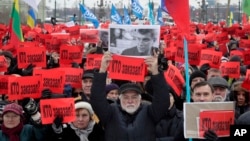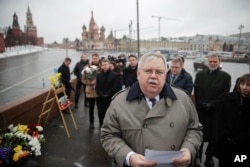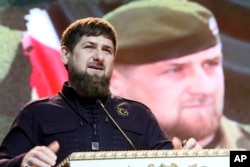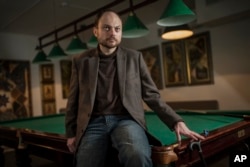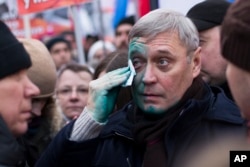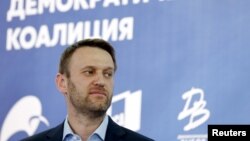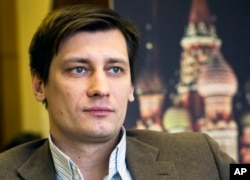The second anniversary of Russian opposition leader Boris Nemtsov's murder was marked Monday in Moscow.
U.S. Ambassador to Russia John Tefft read a message on the bridge where Nemtsov was assassinated, just meters from the Kremlin.
"We are here today to honor his memory, the values for which he stood, and to express our hope for the future, " Tefft said. "We call once more on the Russian government to ensure that those responsible for Boris Nemtsov's killing are brought to justice."
An estimated 15,000 supporters marched in the Russian capital Sunday in Nemtsov's memory, shouting slogans and carrying signs against Russia's involvement in the wars in Ukraine and Syria, and calling for a Russia without President Vladimir Putin.
"We participate for the same reasons Boris did," said poet Lev Rubinstein. "For freedom, against totalitarianism, against war. So all the motives come together."
Supporters also collected signatures petitioning for a permanent memorial plaque to Nemtsov's memory. Authorities have dismissed the idea and an ongoing makeshift memorial of flowers, photos, and messages is routinely torn down by Kremlin supporters and city workers.
Kremlin spokesman Dmitry Peskov on Monday redirected a question on the removal of flowers from the Nemtsov murder scene to Moscow authorities.
"The Russian authorities do everything possible so that the Nemtsov memory will not be immortalized, so that Nemtsov's name will be forgotten, so that such demonstrations won't be held," said opposition activist Ilya Yashin.
Opposition targeted
Nemtsov was shot in the back late at night while walking with a companion in the heavily policed area. Although five Chechen men were arrested, and are standing trial over what authorities say was a contract killing, few supporters believe whoever ordered the murder will face justice.
"I think all traces lead directly to [Chechen leader] Ramzan Kadyrov," Yashin said. "I do not know if Kadyrov is the last element in this chain, but I have no doubt that Kadyrov is involved in this murder."
Kadyrov has denied having anything to do with the killing, despite having connections to one of the suspects and praising him as a patriot after the murder.
Last year, just weeks before the first anniversary of the murder, Kadyrov released a video depicting two other opposition leaders, former Prime Minister Mikhail Kasyanov and Vladimir Kara-Murza, in the crosshairs of a sniper scope.
"Whoever did not get it will get it now!" Kadyrov wrote in the video's description.
Kara-Murza three months later became critically ill and was believed by some to have been poisoned. The same symptoms appeared again at the beginning of February this year, though he has since recovered.
At Sunday's march for Nemtsov, Kasyanov was attacked by a man who threw green dye in his face. A salacious video of Kasyanov was secretly recorded last year, apparently by Russian intelligence, and made available to media.
Opposition uniting?
Russia's divided opposition leaders are hoping to consolidate their forces this year before the 2018 presidential election. Anti-corruption campaigner Alexei Navalny declared his candidacy in December. But in a case widely viewed as political, a Russian court this month found Navalny guilty of defrauding a state company, which effectively bars him from running for president. His lawyers say he will appeal and continue campaigning.
Opposition supporters say they hope to rally the public behind Navalny, who brought tens of thousands to street rallies against the Kremlin in 2011 and 2012.
"There will be, for instance, presidential elections next year and this is a very good motive for the opposition to get united, to stop pushing elbows at each other and isolate a single candidate for the president," Yashin said.
Navalny ran for Moscow mayor in 2013 and won 27 percent of the vote.
Another opposition leader, Dmitry Gudkov, announced plans this month to run for mayor of Moscow in 2018. Gudkov was the last opposition politician to serve as a lawmaker in the State Duma, the lower house of Russia's parliament. He lost a run for re-election last year.
Despite harassment, numerous arrests, and the jailing of his brother, Navalny and his supporters continue to publish investigations into corruption among high-ranking Russian officials.
Navalny declined to comment on his presidential run at Sunday's march for Nemtsov, but his supporters were rallying.
"[I came] in a fighting mood," said Vladimir Milov, a former deputy energy minister and colleague of Nemtsov. "Because I know that many people in Russia are annoyed with this mafioso power. And we watch with interest how Alexei Navalny's campaign is regarded in the regions when he travels and meets the people."
Many will also be watching to see how Russian authorities treat Navalny and his campaign. Political analysts say much will depend on how seriously he is taken as a potential threat by Putin, who still has record high approval ratings.
Like Nemtsov, Navalny is considered among the most charismatic and brave of Russia's opposition leaders. He is also one of the few with a proven track record of rallying the public against the Kremlin. But throwing Navalny behind bars could backfire. As with Nemtsov, silencing Navalny might serve to bring more people to the streets and to the opposition.
VOA’s Ricardo Marquina Montanana and Danila Galperovich contributed to this report.




